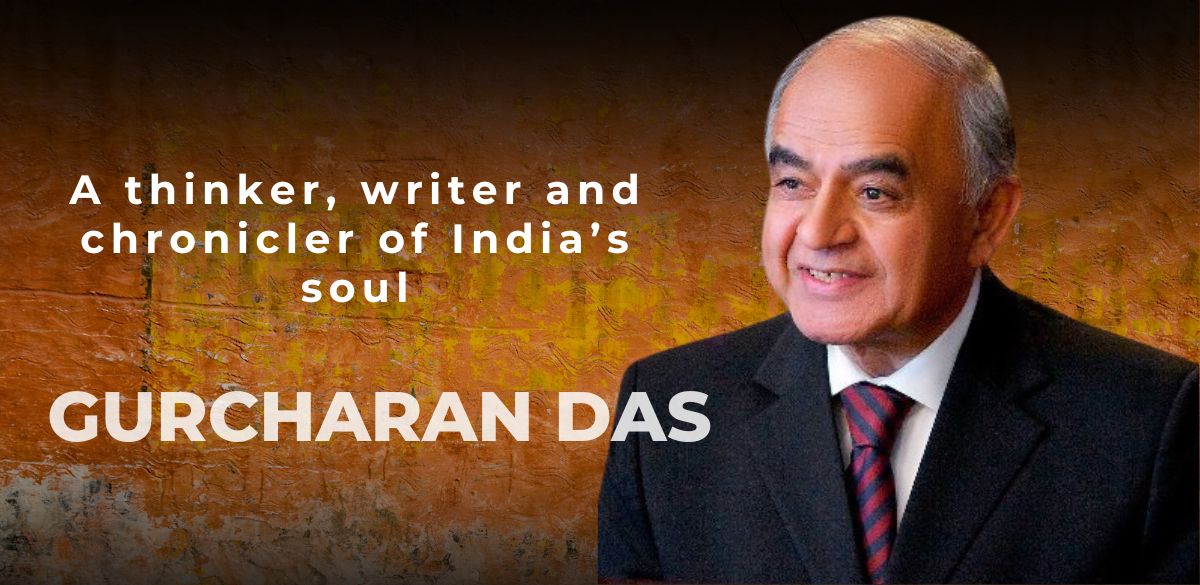Gurcharan Das was born on 3rd October 1943 in Lyallpur, which currently goes by the name of Faisalabad in Pakistan; he is an individual whose impact is still both extant and manifest both in the corporate and the literary world. Once a full-time Procter & Gamble India chief executive, Das is now a full-time writer. Through his trilogy of non-fiction books, essays, and plays, Das adeptly moved in and out of the nuances of India’s history, economy, and culture. His works profusely probe into human conditions and the changing face of modern India, providing insights that are as relevant today as they were then.
Table of Contents
Childhood and Career Change
Das was born during the turmoil of Partition, an apocalyptic event that threw millions out of their homes, his family among them. Das’ family fled from Lahore to Shimla, where Das grew up steeped in Bhakti mysticism because of his father’s influence. The spiritual hunger surrounding him would later punctuate his writing, especially in the mediations on dharma and desire.
Das was educated at Modern School in Delhi, where he went on to win a scholarship to Harvard University. Das completed honours in Philosophy, Politics, and Economics at Harvard University. Though deeply influenced by the thought of political philosopher John Rawls, a lot of whose work he had learned during his time at Harvard, Das opted not to pursue an academic career. Forging into the corporate world, Das started as a trainee with a firm that manufactured Vicks Vaporub. His ascendancy has been meteoric- eventually to the posts of CEO of Procter & Gamble India and, subsequently, to Managing Director of Strategic Planning for Procter & Gamble Worldwide.
However, at 50 years of age, following a very successful career of 30 years, Das went on to take a very bold step to retire early and dedicate himself full-time to writing, an act that turned out to change his life completely.
A Trilogy of India’s Soul
Gurcharan Das’ writing career can perhaps be epitomised by the famous trilogy he has authored that captures the three important classical Indian goals of life: artha (material well-being), dharma (moral well-being), and kama (desire). His first book in the series is a narrative of India’s economic transformation from Independence to the global information age, India Unbound, published in 2002. The book, called “A Quiet Earthquake” by The Guardian, was in its own right a bestseller, and later it was transformed into a very informative BBC documentary. It’s both a personal memoir and a socio-economic analysis of the country’s ascendance from poverty to what’s, at the moment, superpower in the global economy.
The second book, The Difficulty of Being Good (2009), is a journey of philosophy through the Mahabharata by using the epic to explore ethical dilemmas in contemporary life. This is one of his most profound contributions to literature and philosophy, as he confronts the moral challenges that individuals and society face daily.
Concluding the trilogy, Kama: The Riddle of Desire (2018) is an exploration of the depths of emotions and relating while evolving this cycle of desire and satisfaction. This novel, as a work of fiction, steps the reader into a fragile confrontation of duty owed to others and to oneself, creating a lot of self-reflection that would resonate well with readers from all walks of life.
Literary Contributions Beyond Non-Fiction
Besides his trilogy, Das has worked very importantly in Indian theatre and fiction. His plays- Larins Sahib, Mira, and 9 Jakhoo Hill- reverberate so profoundly about India’s historical and spiritual past. The novel A Fine Family speaks of the trauma and resilience of a family from Punjab during and after Partition. It is a genuinely personal account of one of India’s darkest hours.
In bringing economics, history, philosophy, and personal narrative together, Das also stands out as a distinct voice in Indian literature and the world at large. His work casts insightful commentary about India’s development and, more seriously, forms a universal exploration of the human condition.
A Legacy of Thought and Reflection
Gurcharan Das has been a regular columnist for The Times of India and other big dailies, including Financial Times and The Wall Street Journal. His writings covered an extensive spectrum-from governance to the ethics of modern life, drawing from his deep experience with both India and the world.
Gurcharan Das turns 80 this year, but his books have inspired these readers. He can bring personal experiences into broader social and ethical concerns. His ability to transform complex ideas into simple prose has earned him a place among India’s most respected intellectuals. His writing invites readers not only to reflect on the complications of being Indian but also about the universal dilemmas of being human.
The post Gurcharan Das: A Literary Navigator Through India’s Soul appeared first on The Talented Indian.
